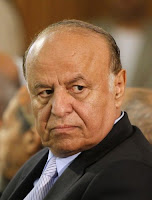There is no doubt that President Hadi took on a challenge when he received handover from Saleh as Yemen's leader. Almost every day since Hadi's presidential inauguration Yemen has featured in the international headlines, headlines that relentlessly report on violence between the country's armed forces and Al Qaeda on the Arabian Peninsula (AQAP). On top of this backdrop of violence, the country is facing famine and a crippling lack of resources to solve its long list of problems. Cue international commentators branding the country a "failed state".
 |
| Yemen is now sufferin |
However, it appears Yemen's international "allies" have realised there is too much at stake to write off Yemen as a failure. Today I read an article by Reuters entitled As violence rises, U.S. and allies pulled into Yemen. In the article Reuters' Peter Apps writes that the US, having lost its appetite for Afghanistan/Iraq-style full-scale on-the-ground intervention, is now trying a more subtle approach to meddling in Yemen (drone attacks aside). Whilst there are no US troops officially on the ground in Yemen, there is an ever increasing presence of US military advisors attempting to guide Hadi and shape his anti-al-Qaeda strategy. One can easily understand the US motivation for wanting to crush al-Qaeda and help Hadi gain control. From a US point of view a "failed" Yemen is a potential petri dish for anti-US terror plans. Indeed, it is already widely assumed that several recent terror plots were conceived and developed in Yemen.
The US is not the only foreign country providing support to Yemen. Saudi Arabia and other members of the Gulf Cooperation Council (GCC) have provided Yemen with financial aid to help restore order in the troubled country. As much as the idealist in me wants to attribute these donations to the GCC's sense of Arab Nationalism I know this is unlikely to be the case. Located in close proximity to Yemen, the GCC countries will all share a common concern of having a "failed state" as a neighbour.
 |
| The GCC may soon be adding a 7th seat at its table |
In fact grumblings are already surfacing: Saudi Arabia has expressed its concern that violence in northern Yemen could spill over the border into its territory. The mutterings from within the GCC to provide a chair at its mahogany table for Hadi are, I'm sure, an attempt to help provide more unrestricted advice to and influence the otherwise stricken state. Why else would affluent countries such as The UAE and Oman wish to welcome Yemen into their rich-mans-club? After all, there is little Yemen can offer in return. For me the answer is not too tricky: whether it be members of the GCC or western superpowers, all countries trying to "save Yemen" are motivated by a desire to safeguard their own national security.

No comments:
Post a Comment